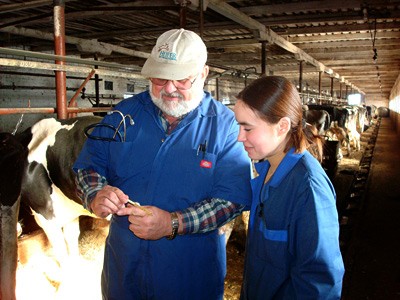Roger Ellis spreads veterinary expertise from Honduras to Ethiopia to rural Russia
By Jill McCoy
Thanks to the recent work of Roger Ellis '73, DVM '77, cows in Yaroslavl, Russia, may soon have a better quality of life.
Dairy veterinarians work on farms around Yaroslavl, a city 200 miles northeast of Moscow, but rural poverty limits resources and education. Many veterinarians have not obtained adequate experience in surgical procedures, and even if they have, they may not have the tools to carry them out.
To offer his expertise, Ellis went to Yaroslavl March 15-April 5 to meet farmers and veterinarians. He trained veterinarians to carry out efficient and safe surgeries and also taught cattle breeding methods.
He was volunteering with a project called Farmer-to-Farmer, a U.S. Agency for International Development organization that gives technical assistance to farmers and agriculturally based businesses in developing countries. Farmer-to-Farmer cooperates with eight "implementing agencies." One of the agencies that works in Russia is called ACDI/VOCA, which is dedicated to worldwide poverty alleviation and economic growth.
This was Ellis' eighth assignment with Farmer-to-Farmer. He first became involved with the program in 1987 when he traveled to Honduras as a consultant for the Peace Corps. Since then, he has completed two other assignments in Honduras, four in Russia and one assignment last year in Ethiopia.
Describing the value of the Farmer-to-Farmer experience, Ellis said there is "a lot to learn about different areas, different breeds of cows and different problems." For example, in Ethiopia's fledging dairy industry, cows are milked mostly by hand.
One problem facing dairy farming in rural Russia, Ellis said, is a lack of adequate housing for cow herds. As a result of barn shortages, cows produce about 8,800 pounds of milk per year, less than half of what they could, and should, be giving.
During his three weeks in Yaroslavl, Ellis trained two young vets to perform Caesarian sections on cows. Operating with few resources, Ellis noted, had not deterred the doctors from unwavering dedication to their work. They were eager to learn ways to improve the lives of the cows and enhance Russia's dairy industry.
An important goal of ACDI/VOCA is fostering cultural exchange through skill sharing. With programs like these, Ellis said, "we can make a difference in how we are perceived as a country" while helping dairy farmers, for example, be more successful. Despite the economic and cultural differences he observed, "you realize that these farmers and cattle people are not that different from you, here in the United States," he said.
After graduating from Cornell, Ellis owned a veterinary practice in Vermont, studied and taught at Michigan State University and then was a partner in a private practice, specializing in large animal veterinary medicine and surgery in Granvillle, N.Y. For the past seven years he has worked as a field veterinarian for the New York State Department of Agriculture and Markets.
He said that ACDI/VOCA is always looking for mid- to late-career volunteers in various areas of expertise to take part in overseas assignments. These are wonderful and positive experiences, he said, "that help us understand and make the world just a little bit smaller."
For more information, visit http://www.acdivoca.org/.
Jill McCoy '09 is a writer intern for the Cornell Chronicle.
Media Contact
Get Cornell news delivered right to your inbox.
Subscribe